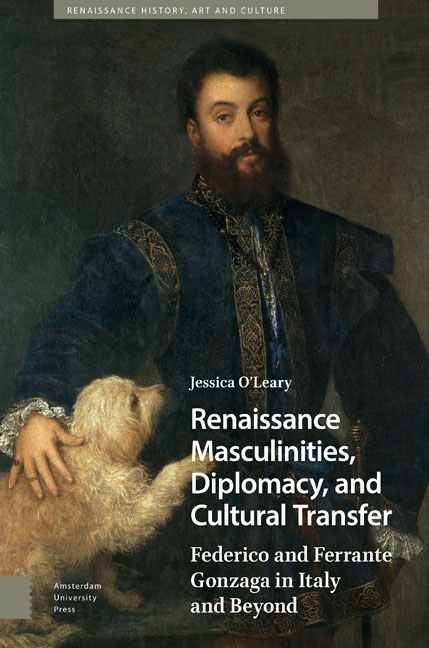 Renaissance Masculinities, Diplomacy, and Cultural Transfer
Renaissance Masculinities, Diplomacy, and Cultural Transfer Book contents
- Frontmatter
- Contents
- Acknowledgements
- Abbreviations
- Maps and Figures
- Introduction
- 1 Crisis Diplomacies in the Italian Wars
- 2 Warring Masculinities
- 3 Imperial Masculinities
- 4 Diplomacy of Magnificence
- 5 Imperial Networks and Loyalties
- 6 Interpretations of Renaissance Masculinities
- Conclusion
- Bibliography
- Index
Conclusion
Published online by Cambridge University Press: 08 May 2024
- Frontmatter
- Contents
- Acknowledgements
- Abbreviations
- Maps and Figures
- Introduction
- 1 Crisis Diplomacies in the Italian Wars
- 2 Warring Masculinities
- 3 Imperial Masculinities
- 4 Diplomacy of Magnificence
- 5 Imperial Networks and Loyalties
- 6 Interpretations of Renaissance Masculinities
- Conclusion
- Bibliography
- Index
Summary
In the town of Guastalla, an imposing two-metre-tall bronze statue of Ferrante Gonzaga gazes down at his prey. Dressed as a Roman warrior, the balding general stands with one foot atop the personification of envy, right hand on his hip and his left holding a spear. The striking statue was commissioned by Cesare Gonzaga in 1560 and completed five years later. Today, the statue stands in front of the Palazzo Ducale in the town's centre, known to locals as “Franton.” Latin inscriptions on the modern pedestal announce the duke's titles and deeds, while, at the base, locals have placed a makeshift panel in memory of the partisan Franco Filippini, shot by fascists on December 17, 1944. Despite four hundred years separating both Italians, the acts of war, and how certain deeds are remembered, link both men.
This book has examined the diplomatic strategies deployed in reaction to changing political systems during times of crisis. It has sought to explore how Italian men experienced the impact of the Italian Wars by investigating the different masculinising political and diplomatic strategies they deployed to confront conflict. Initially, the Wars produced intense instability and ended the balance of power on the Italian peninsula between the larger city-states. Instead, rulers had to contend with foreign invasion, pestilence, famine, and ruin at a scale that they had not encountered for at least two generations. Smaller rulers, like the Gonzaga, were left bereft and turned to different modes of crisis diplomacy to preserve their authority and prevent capitulation to foreign forces. In addition to double diplomacy, the making and unmaking of treaties, and fair-weather friendships, the Gonzaga also sent their children abroad to pledge fealty in exchange for protection.
However, the initial phase of the Wars eventually gave way to something akin to a new status quo in Italy. The rise of Charles V and Spanish dominance in Italy confined the brutality of war to the north-western flank of the peninsula and allowed the next generation of the Gonzaga to engage in different forms of diplomacy to forge stability in their various domains. Crisis diplomacy shifted to cultural diplomacy, performances of loyalty and fealty, and participation in imperial networks that served to facilitate deeper connections between the Gonzaga and Spanish Habsburgs as part of a united imperial world.
- Type
- Chapter
- Information
- Renaissance Masculinities, Diplomacy, and Cultural TransferFederico and Ferrante Gonzaga in Italy and Beyond, pp. 215 - 218Publisher: Amsterdam University PressPrint publication year: 2024
